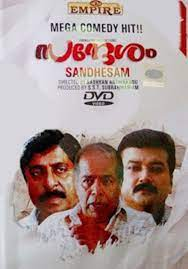One-line review: A crackling comedy about Kerala’s rabid politics couched as a family drama.
Sandhesham was a modest hit when released but has become one of Malayalam cinema’s foremost political satires over the years. Director Sathyan Anthikad remembers scriptwriter Sreenivasan telling him that although he was unsure if the film’s story would appeal to the audiences, he was confident the film would have some memorable lines. As Sreenivasan predicted, many of the film’s lines are now part of every Malayali’s vocabulary. The director-writer team of Sathyan Anthikad and Sreenivasan is at the helm of many all-time Malayalam hit comedies. But Sandhesham is probably their most serious despite being a comedy. They wanted to make a film exposing the state of contemporary politics in Kerala but knew that it would only resonate with the audiences if told as a humorous family drama.
Director Anthikad admits that the film’s spine is its script, which crackles with one gag after another, poking fun at the shallowness of politics, and its pawns. But it’s the melancholy counterpoint to the comedy that elevates the film to its cult status. And some stellar performances by its all-star cast. Some scenes in the movie seem caricaturish today, but the script is strong enough to make us overlook these minor stumbles.
The film begins with Raghavan Nair’s (Thilakan) journey to his home in Kerala after retiring from his railway job in the neighboring state of Tamil Nadu. He is looking forward to an idyllic retirement with his wife, Bhanu (Kaviyoor Ponamma), two adult sons, a daughter, and a younger son. A planner by nature Nair just bought a plot of land with all his retirement savings and is confident the land will provide him with the means to finance his only remaining responsibility, his daughter’s marriage.
We then meet the two unemployed adult sons, rabid political party workers, but for opposing parties. The film does not use real party names, but it is evident that they are Kerala’s two dominant parties, the Congress Party, and the Communist Party. The older son, Prabhakaran (Sreenivasan), a lawyer by training, is a strategist for the Communist Party. The second son, Prakashan (Jayaram), also works full-time for the Right-wing party. Prakashan is tipped to be a party’s future leader because of his charisma and leadership qualities. The film is set in North Kerala, where politics is a way of life; it’s not uncommon to see school kids actively participating in strikes and demonstrations.
The film starts on a light foot by showcasing the ideological arguments between the sons at the dinner table, impressing their dad with their intellect. The dinner table is the setting for one of the film’s evergreen lines when Prabhakaran, close to being outwitted by his brother, takes offense to his using Poland (a then leftist country) as an example. But soon, we see the similarities between the two sons and their parties. Both sons have no qualms living off their father’s meager pension or using their party work as an excuse to get away from responsibilities at home, including visiting their mother in hospital (they are serving the more significant mother, India). The local party meetings hilariously show us how the so-called intellectuals use complicated jargon to avoid facing their party’s defects. They also make the grass root workers do all the heavy lifting (“first obey, then question,” is their leader’s common refrain). All of this is still true, hence the movie’s freshness even today.
Lest we lose our faith in humanity, the film also has idealistic characters. Raghavan Nair’s best friend and neighbor Achu (a stellar Oduvil Unnikrishnan) is the only one always by his side and giving him sane advice. The new agricultural officer Udayabhanu (Siddique in a breakthrough role), whose sincerity to his job makes him impervious to the local politician’s threats of transferring him to remote locations. He also ends up marrying Raghavan Nair’s daughter Lathika (Mathu) without any demands for dowry and becomes more of a son to Raghavan Nair than his real sons.
At its core, the film is a thorough entertainer with biting dialogues delivered with ease by its stellar cast. Sadly, many cast members are no longer alive, including the maestro Thilakan who doesn’t act but lives the part. It’s hard to believe that Thilakan shot the movie during the short breaks from another movie (Godfather) he was shooting nearby. And that Sreenivasan hastily wrote Thilakan’s lines after he knew they would be shooting the next day. The film is director Anthikad’s familiar territory: the lush Kerala interiors with colorful characters.
The film ends a tad too predictably with Raghavan Nair finally standing up to his sons, making them reform almost instantaneously. But a happy ending is what makes it a family film, a sugar-coated bitter pill that gets its inherent message across. In recent years some have questioned the film’s message accusing it of denouncing politics. Perhaps all the debate about the film’s message is because of its provocative title, “Sandehsam (message).” The filmmakers point out that the film is not anti-politics, its message is that responsibility begins at home: be a responsible breadwinner before you set out to reform society.
Why watch it? For a master class in how excellence is timeless.


